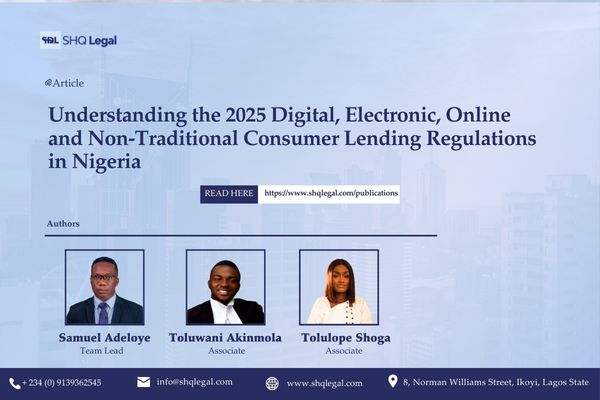1. INTRODUCTION
1.1. The Federal Competition and Consumer Protection Commission (the “FCCPC”) in August 2022 issued the Limited Interim Regulatory/Registration Framework and Guidelines for Digital Lending, 2022 (the “Framework”) to regulate the digital lending space as well as make provisions for the requisite requirements for registration/approval in order to allow businesses to carry out the business of digital lending in Nigeria.
1.2. The Framework provides for the compulsory registration of digital lenders with the FCCPC prior to the commencement of any digital lending business operations in Nigeria.
2. POTENTIAL REGULATORY CONFLICT
2.1. Before the Framework was introduced, there was no specific legislation or guideline on digital lending in Nigeria and companies that sought to carry on the business of digital lending were required to obtain a Money Lenders License in any of the 36 states of Nigeria and the FCT, operating under the extant money lending laws of the States. A Money Lenders license holder is permitted to carry on money lending activities only within the state where the license was procured.
2.2. An alternative to the foregoing is the option to obtain a license from the Central Bank of Nigeria (CBN) to operate as a Finance Company in accordance with the Revised Guidelines for Finance Companies in Nigeria. This regulatory route, moreover, offers a broader spectrum of permissible business activities within the financial services sector, for instance, licensees are able to offer services such as funds management, asset financing, project financing, local and international trade financing, debt factoring, debt securitization, financial consulting, loan syndication, and the issuance of token stamps, coupons, and cards.
2.3. A careful review of the Framework reveals that it seeks to apply to all digital lending businesses in Nigeria regardless of their enabling license. This is contradictory to the provisions of the Banks and Other Financial Institutions Act, 2020 (“BOFIA”) which expressly excludes the provisions of the Federal Competition and Consumer Protection Act 2018 (“FCCPA”) from applying to financial institutions licensed by the Central Bank of Nigeria (“CBN”).
2.4. It is important to note that the FCCPA empowers the FCCPC to make regulations such as the current Framework which impacts on businesses in Nigeria. In light of this, it is reasonable to envisage the Framework having notable legal implications for affected companies. Notwithstanding this, it may also be imported from the provision of BOFIA that the reach of the FCCPC, and by extension the Framework, does not extend to entities licensed by the CBN, save for qualifying transactions relating to mergers or other forms of business combinations.
3. IMPACT ON DIGITAL LENDERS IN THE ECOSYSTEM
3.1. In light of the provisions of Section 65(1) of the BOFIA, it may be canvassed that the Framework has little, if any, immediate or remote impact on money lenders licensed by the CBN owing to the express exclusion of the FCCPA from the regulation of banks and financial institutions licensed by the CBN. Thus, entities already licensed by the CBN may not be required to register under the Framework.
3.2. It is important to note that the Framework would only apply to institutions involved in money lending business outside the scope of the Central Bank of Nigeria. In the case of companies which provide loan facilities to its customers in the ordinary or ancillary course of its business, either directly or through structured products or securities, regulatory engagement may be required to determine whether registration with the FCCPC is necessary.
4. DIGITAL LENDING REGISTRATION
The Framework directs every digital lending operator in Nigeria to complete the FCCPC Interim Digital Lending Guidelines Form 001 (“Form 001”). We have provided in the table below, a snapshot of some requirements contained in Form 001:
CONCLUSION
The Framework albeit novel, is silent on a number of key matters, including but not limited to, the applicable fees for registration, whether same is renewable or a one-off, penalty for non-registration as well as a clear exemption of financial institutions licensed by CBN, however we take note of the provisions of section 65(1) of the BOFIA as highlighted above.
We recommend that entities likely to be affected, by reason of their scope of business activities, should commence the process of engagement and/or registration in line with the provisions of the Framework to ensure compliance and in the process of doing so, the requisite questions surrounding the grey areas may be raised.

.png)
.png)

.png)








